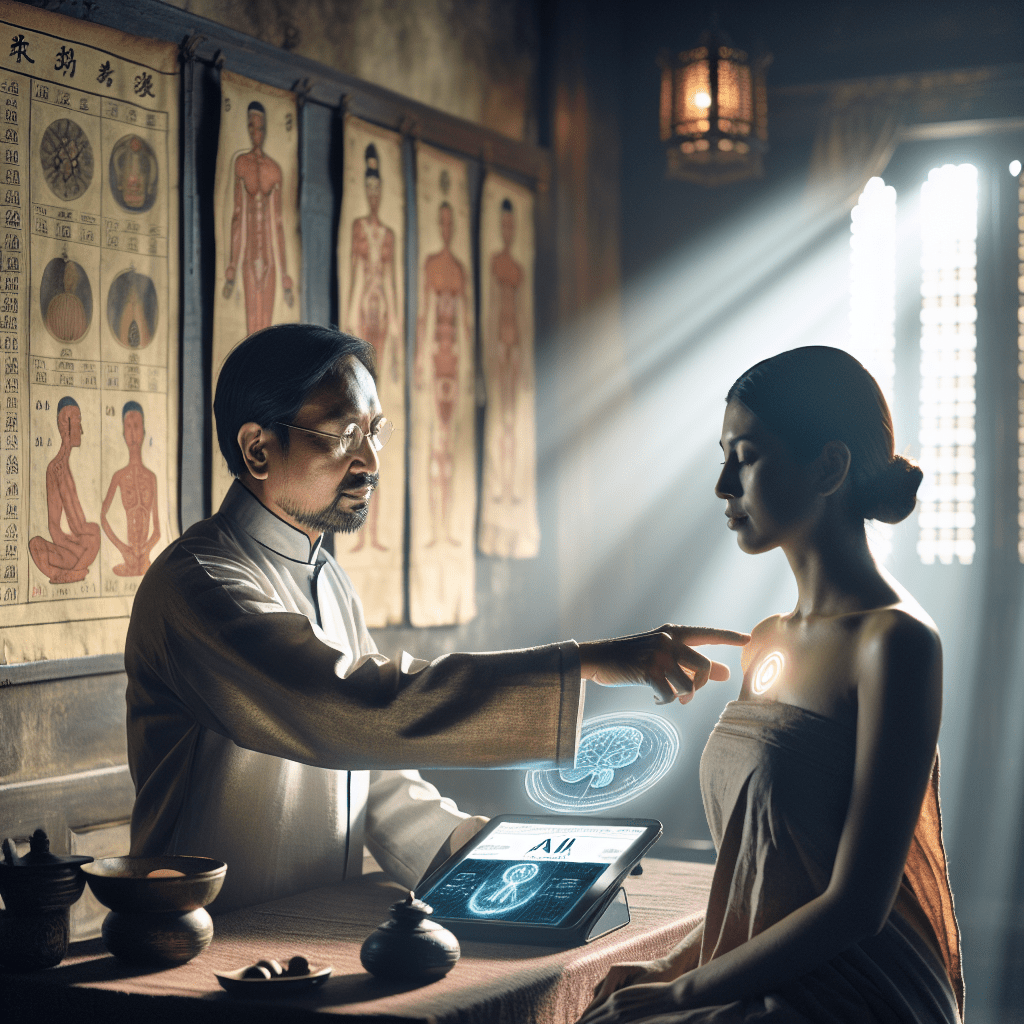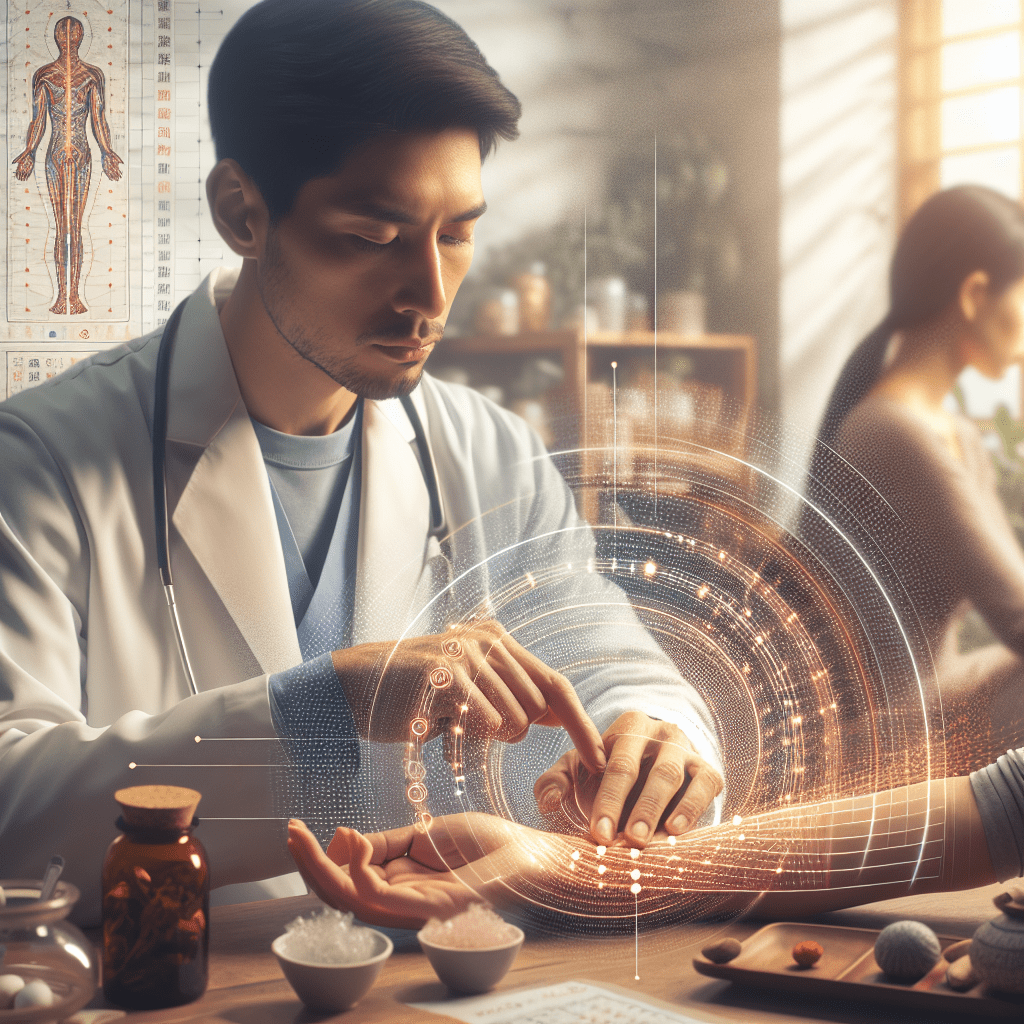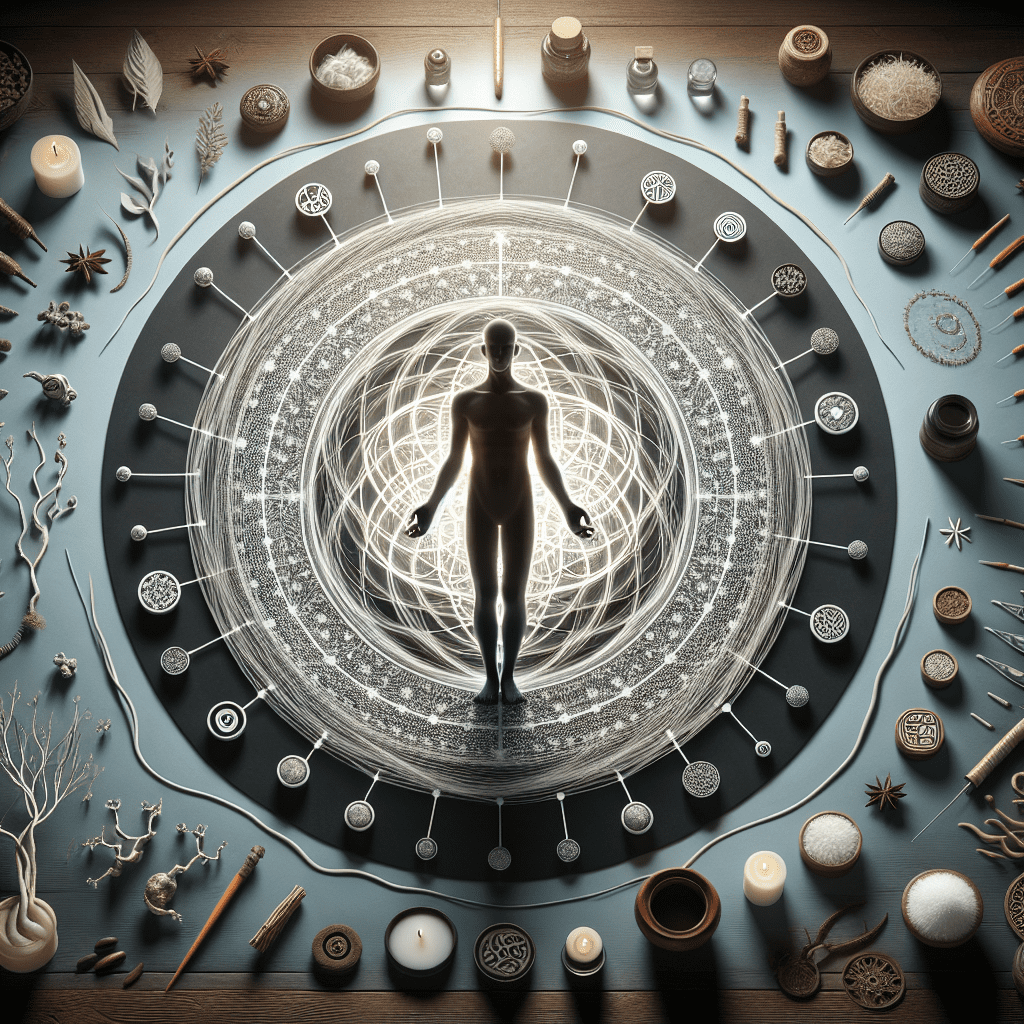In a world where cutting-edge technology seems to advance at lightning speed, there’s something beautifully unexpected happening in the realm of holistic health. Traditional Chinese Medicine (TCM), with its 2,000-year-old wisdom, is joining hands with artificial intelligence—creating a fascinating blend of ancient healing arts and modern innovation that might just revolutionize how we approach wellness.
This exciting fusion isn’t just about preserving tradition or embracing technology for its own sake. It represents something much more meaningful: a bridge between time-honored healing practices and the precision of data-driven approaches. At HerbalsZen, we’ve always believed that the most powerful healing comes from honoring ancient wisdom while embracing modern advancements—a philosophy perfectly embodied in the emerging field of AI in TCM.
Enhancing Diagnostic Accuracy: The Marriage of Ancient Observation and Machine Learning
The convergence of AI with Traditional Chinese Medicine diagnostic methods is opening new frontiers in healthcare precision while maintaining the holistic perspective that makes TCM unique.
One of the most promising applications of AI in TCM lies in its ability to enhance diagnostic accuracy. Traditional Chinese Medicine has always relied on meticulous observation—examining the tongue, reading the pulse, noting facial colors, and understanding symptoms within the context of whole-body patterns. These observations, while incredibly valuable, can vary between practitioners based on experience and training.
Enter artificial intelligence. By applying machine learning algorithms to vast datasets of tongue images, pulse readings, and patient histories, AI systems can now detect subtle patterns that might escape even the most experienced practitioners. For example, recent research has shown that AI can analyze thousands of tongue images with remarkable precision, identifying correlations between specific tongue characteristics and health conditions that align with traditional TCM diagnostic principles.
As one researcher noted in a recent study, “AI-powered pulse diagnosis machines are translating centuries-old tactile diagnostic techniques into objective, reproducible data points.” This means more consistent, accurate diagnoses that honor the depth of TCM wisdom while reducing subjective variation.
The result? More precise predictions and better patient outcomes—all while preserving the holistic approach that makes TCM so valuable.
Accelerating Herbal Discovery: AI as the Modern Herbalist’s Assistant
AI is transforming how we discover and validate herbal remedies, combining ancient knowledge with modern scientific methods to identify effective natural compounds faster than ever before.
For thousands of years, TCM practitioners have relied on intricate knowledge of hundreds of herbs and their combinations to create personalized formulations. Today, AI in TCM is revolutionizing this process through advanced screening and discovery techniques.
AI algorithms can now rapidly analyze thousands of herbal compounds, predicting their therapeutic effects and potential interactions based on their molecular structures. This capability dramatically accelerates the process of identifying effective herbal combinations for specific health conditions.
A fascinating example comes from researchers who used AI to screen hundreds of natural compounds from traditional herbs, successfully identifying several with promising activity against neglected tropical diseases. This work would have taken years using conventional methods but was accomplished in mere months with AI assistance.
Additionally, AI systems help standardize herbal formulations by ensuring consistent quality and potency—a critical factor in establishing TCM’s credibility within the global healthcare community. Machine learning models can predict the ADMET (absorption, distribution, metabolism, excretion, and toxicity) properties of herbal compounds, helping select the most promising active molecules from complex herbal mixtures.
This marriage of ancient herbal wisdom and cutting-edge technology is creating new possibilities for natural healing solutions that are both time-tested and scientifically validated.
Personalized Treatment Plans: Where AI Meets Individual Constitution
The personalized approach of TCM finds its perfect complement in AI’s ability to process complex individual data, creating truly tailored healing protocols that respect your unique constitution.
At the heart of Traditional Chinese Medicine lies the concept of personalization—recognizing that each person has a unique constitutional type and requires individualized treatment. This principle aligns perfectly with modern medicine’s growing focus on personalized care, and AI in TCM is making this approach more accessible than ever.
By analyzing vast amounts of patient data—including constitutional types based on Five Element Theory, lifestyle factors, and health histories—AI systems can generate highly personalized treatment recommendations. These plans consider not just symptoms but the entire pattern of disharmony unique to each individual.
For instance, EASTCHI AI, HerbalsZen’s flagship product, delivers customized nutrition plans and lifestyle recommendations grounded in Eastern medical theories while adapting to individual constitutional needs. The system can process complex relationships between a person’s constitution, current symptoms, seasonal influences, and dietary preferences to create truly personalized healing protocols.
What makes this approach particularly powerful is that it preserves the holistic nature of TCM while adding the precision and adaptability of artificial intelligence. The result is truly personalized medicine that honors both traditional wisdom and individual uniqueness.
Predictive Analytics: Anticipating Health Patterns Before They Manifest
One of the most revolutionary aspects of integrating AI in TCM is the development of predictive analytics that align with TCM’s preventive philosophy. Traditional Chinese Medicine has always emphasized preventing disease before it manifests—addressing subtle imbalances before they develop into serious conditions.
AI systems can now analyze patterns in patient data to predict potential health issues before they become symptomatic, perfectly complementing TCM’s preventive approach. By identifying subtle shifts in pulse patterns, tongue appearance, and other biomarkers, these systems can alert practitioners to emerging imbalances that might otherwise go unnoticed until more serious symptoms develop.
As one researcher in the field explained, “AI models processing large amounts of textual and visual data can detect patterns that predict disease progression with remarkable accuracy, allowing for earlier intervention based on TCM principles.”
This predictive capability allows for more proactive treatment strategies, potentially catching health issues at their earliest stages when they’re most responsive to gentle, natural interventions—truly embodying the TCM philosophy that the best doctor prevents disease rather than treating it after it manifests.
Knowledge Sharing: Building a Global TCM Intelligence Network
For centuries, TCM knowledge has been passed down through lineages of practitioners, often with regional variations and specialized expertise. While this tradition has preserved invaluable healing wisdom, it has also sometimes limited the exchange of knowledge between different schools and approaches.
AI in TCM is transforming this landscape by facilitating unprecedented knowledge sharing among practitioners worldwide. Advanced natural language processing can analyze thousands of classical TCM texts and modern clinical records, creating vast knowledge repositories that integrate diverse perspectives and approaches.
This technology enables practitioners to access collective wisdom that spans geographical boundaries and generations of practice. A doctor in Beijing can instantly benefit from treatment approaches developed in Shanghai, Taiwan, or San Francisco—creating a global intelligence network that honors the diversity of TCM traditions while making their collective wisdom more accessible.
The result is a more integrated, collaborative approach to TCM practice that benefits practitioners and patients alike. As one expert noted, “AI is helping bridge traditional knowledge systems with modern clinical practice, creating a more unified and evidence-based approach to TCM.”
Continuous Monitoring: The Ever-Present TCM Consultant
Traditional Chinese Medicine has always emphasized the importance of adjusting treatments based on the patient’s changing condition. Historically, this required frequent visits to a practitioner who would observe subtle changes and modify herbal formulations or acupuncture protocols accordingly.
Today, AI tools enable continuous monitoring of patient progress, allowing for real-time adjustments to treatment plans. Wearable devices can track relevant biomarkers, sleep patterns, and other health indicators, while AI algorithms interpret this data through the lens of TCM principles.
For example, an AI system might detect changes in heart rate variability that indicate a shift from a Liver Qi stagnation pattern to a Heart Blood deficiency pattern, suggesting a need to adjust herbal formulations accordingly. These insights can be shared with practitioners, who can then refine treatment approaches without requiring frequent in-person consultations.
This continuous feedback loop between patient, AI system, and practitioner ensures that treatments remain effective as the patient’s condition evolves—bringing the responsive, adaptive nature of traditional TCM practice into the modern, connected world.
Enhancing Research: Building the Evidence Base for TCM
One of the historical challenges facing Traditional Chinese Medicine in the global healthcare landscape has been generating the kind of robust scientific evidence demanded by modern medical institutions. The complex, holistic nature of TCM has sometimes made it difficult to study using conventional research methodologies.
AI in TCM is changing this equation by providing new tools for researching traditional practices. Machine learning models can analyze complex, multi-variable systems—precisely the kind of systems that TCM represents—identifying correlations and outcomes that might be missed by more reductive research approaches. This approach aligns with science-backed alternative medicine methodologies.
Recent studies leveraging AI techniques have shown promising results in validating traditional TCM approaches. For instance, research using multimodal deep learning models has demonstrated objective correlations between tongue diagnosis and specific health conditions, providing scientific evidence for diagnostic techniques that have been used for centuries.
As one researcher put it, “The integration of machine learning has led to significant advancements in TCM diagnostics and personalized medicine, paving the way for the modernization and wider acceptance of these traditional practices.”
This growing body of evidence helps bridge the gap between traditional wisdom and modern scientific understanding, potentially accelerating the integration of TCM approaches into mainstream healthcare systems worldwide.
The Harmonious Future: Where Ancient Wisdom and AI Converge
The future of holistic healing lies not in choosing between tradition and innovation, but in their thoughtful integration—creating healthcare approaches that are both deeply rooted in wisdom and enhanced by cutting-edge technology.
As we look toward the future of holistic healing, the integration of AI in TCM represents not just a technological advancement but a philosophical harmony—a way of honoring ancient wisdom while embracing the possibilities of modern innovation.
This approach aligns perfectly with HerbalsZen’s vision of EASTCHI AI, where 2,000-year-old Eastern medical knowledge meets cutting-edge artificial intelligence. We believe that true healing comes not from choosing between tradition and innovation, but from their thoughtful integration—creating approaches that are both deeply rooted and forward-looking.
The future of holistic healing likely lies in this balanced approach—where AI enhances rather than replaces the human elements of TCM practice, where technology serves as a tool for making ancient wisdom more accessible and effective, and where we recognize that both traditional knowledge and modern science have valuable contributions to make to human health.
By embracing this harmonious integration of AI in TCM, we open new possibilities for health and healing that honor the best of both worlds—creating a future where the wisdom of the ages meets the precision of modern technology, and where holistic healing becomes more personalized, accessible, and effective than ever before.




